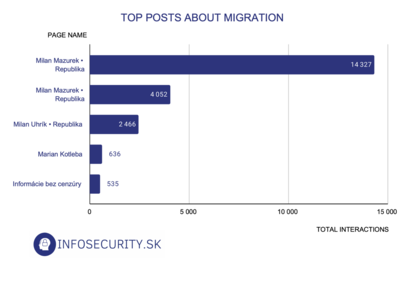Disinformation
The West is being blamed for prolonging the War in Ukraine, Slovak far-right politicians are spreading false narratives about migration

Infosecurity.sk presents an overview of disinformation trends that have been on the rise in information space in the past two weeks:
- Disinformation actors in Slovakia have been actively spreading narratives regarding the war in Ukraine, falsely claiming that Western countries benefit from the conflict and reject peace negotiations.
- Far-right parties amplify anti-migration sentiment, exaggerating the situation and creating a false sense of urgency by referring to an "invasion of illegal immigrants."
- As elections approach, disinformers are spreading unsubstantiated allegations of election manipulation, targeting the US and NGOs.
Western countries allegedly benefit from the war in Ukraine and refuse peace negotiations
Since its beginning, the war in Ukraine has steadily been a primary topic among disinformation actors in Slovakia. Pro-Russian, anti-Ukrainian and, by extension, anti-Western rhetoric is largely flexible, opportunistic, and easily adapts to current events. However, there are also several narratives that are already firmly rooted in the Slovak information space and are repeated by the disinformers time and time again. These include the false assumption that the Western world, led by the US and the EU, is rejecting peace negotiations and artificially prolonging the war.
One of the most popular posts spreading this narrative in the past two weeks belongs to Miroslav Radačovský, an MEP and chairman of the nationalist party Slovenský Patriot (Slovak Patriot). Radačovský shared a video of his speech in the European Parliament, in which he calls the war in Ukraine “the historic dream of the Anglo-Saxons” and suggests that the West is not seeking peace. The video has accumulated over 170 thousand views at the time of writing this report.
Other actors extend this narrative by saying that the war in Ukraine is benefiting third parties and therefore peace negotiations are not taking place. Robert Fico, chairman of the anti-system SMER-SSD party, says that these actors are “Western arms factories” while according to one Slovak disinformer Ľuboš Hrica, the war benefits “sell-out politicians” and the “European and American arms industries”.
Through such rhetoric, the disinformers create the illusion that the Western countries are in reality behind the conflict and can thus unilaterally end the war. This also diverts attention from the fact that the aggressor in the conflict is Russia, which can withdraw its military forces from Ukraine at any time and secure the peace that the disinformers are persistently demanding from Western countries.
Far-right parties attempt to create an illusion of an invasion of refugees
In the last two weeks, we have observed an increase in the number of negative narratives regarding migration to Slovakia from war-affected areas in Middle Eastern countries. This hostile rhetoric is predominantly utilised by members of far-right parties such as Republika and Kotlebovci-ĽSNS, which present the suppression of illegal migration as one of the main points of their political agendas.
The most active actor in this issue was undoubtedly Milan Mazurek from the right-wing Republika party, who called for tighter border controls and at the same time criticized the incumbent government for its inaction. In one of his Facebook posts, he claims that there is “an invasion of illegal immigrants” in Slovakia, deliberately exaggerating the situation and creating a false sense of urgency. In another post, he writes that the Republika party is ready to “stop the influx of illegal aliens and protect our children, women and families!”.
In a similar manner, Milan Uhrík, an MEP and also a chairman of the Republika party, wrote: “I ask, what are we waiting for? For the first rape or murder? Then will they all moan and babble again about the poor souls fleeing a war?”
Far-right politicians often mention criminality in their posts and point to specific incidents which were perpetrated by refugees in other countries. However, this can be seen as highly dangerous, as it generalises every foreigner fleeing war as a threat and thus incites hostility towards them. It is also precisely this kind of rhetoric that is an effective tool for radical parties to instil fear and insecurity in the public, which then helps them to gain more popular support before the elections.
Since posts about illegal migration have been prevalent in Slovak information space in the past two weeks, we also looked at them through an optic of a list of disinformation actors in Slovakia. We used the CrowdTangle analysis tool to analyse the most popular posts on Slovak Facebook that include the keyword “migrants“. Posts were evaluated based on the total number of interactions (the sum of all reactions, comments, and shares).
As the data shows, the top 5 posts containing malicious narratives about refugees belong to politicians from Slovak far-right parties, namely the Republika and ĽSNS-Kotlebovci parties. The only exception is a disinformation site Informácie bez cenzúry (Information without censorship).

The first two places belong to the aforementioned posts by Milan Mazurek. In the first one, he calls the refugees “illegal aliens” and portrays them as highly dangerous for Slovak citizens. The second post contains similar rhetoric, with Mazurek stating that illegal migration poses “a huge problem” for Slovakia.
The third place belongs to the aforementioned post by Milan Uhrík, in which he also warns against the imaginary dangers of migration and notably exaggerates the situation.
Marian Kotleba, the chairman of the extreme right-wing ĽSNS-Kotlebovci party, wrote on his Facebook page that illegal immigration to Slovakia is the consequence of EU migration politics. This kind of rhetoric is long-standing among disinformation actors and could be previously seen regarding the discussion about compulsory quotas, which is an issue that has been highly misinterpreted.
Disinformation site Informácie bez cenzúry (Information without censorship) shared a statement of Hungarian prime minister Viktor Orbán, in which he criticises the EU migration policies and calls them “Brussel’s dictate”.
Allegations of election manipulation
With the upcoming elections in Slovakia in September, the narrative that foreign influences are planning to interfere in the elections and thus install their own candidates in the government is increasingly being spread in the information space by various actors. This narrative is largely directed against the United States and NGOs, which, according to disinformers, intend to manipulate the elections.
Milan Uhrík wrote that “Slovakia is facing a psychological operation from the USA in order to influence the outcome of the elections” and that the aim is to “destroy the opposition and to ensure that the elections turn out according to Washington's needs”.
The disinformation site Matovičov cirkus (Matovič´s circus - named after the ex-Prime Minister Igor Matovič, who’s rule was rather chaotic) claims that NGOs are “working 100% to control the state again after the elections” and that they are preparing to “betray the Slovak nation”. It is important to add that NGOs have recently become a frequent target of attacks from these types of actors.
The aim of spreading unsubstantiated disinformation about rigged elections is to create information chaos, undermine the authority of state authorities and prepare for the event of their electoral failure. This rhetoric is, however, highly dangerous since it exploits the attitudes of frustrated citizens who have doubts about the fairness of the electoral system and thus increases their conviction of the impossibility of a fair election. Furthermore, these accusations build on the narrative of a "stolen election" that launched the election campaign of many actors - especially the Republika or SMER-SSD party. At the same time, it is also worth adding that Slovakia has so far had no demonstrable issues with the fairness of the electoral process (e.g. according to OSCE reports).
Project Infosecurity.sk organized by Adapt Institute, which is supported by the Prague office of the Friedrich Naumann Foundation for Freedom, continuously monitors the activities of both Slovak and foreign disinformation actors, but focuses mainly on the former. The project activities are built upon daily monitoring of emerging disinformation, hoaxes, and conspiracy theories in the online information space. This approach allows the analysts to identify disinformation posts and narratives that resonated with the public the most, as well as to find out where they originated, and how they spread and evolved on social media. The report takes the form of a bi-weekly summary of arising trends in the spread of malicious information content online. Based on that, Infosecurity.sk can warn the public about emerging and current trends in the field of disinformation, manipulation, and propaganda.

